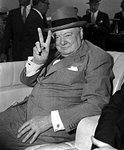By WILLIAM KRISTOL
Last October, a reporter asked Barack Obama why he had stopped wearing the American flag lapel pin that he, like many other public officials, had been sporting since soon after Sept. 11. Obama could have responded that his new-found fashion minimalism was no big deal. What matters, obviously, is what you believe and do, not what you wear.
But Obama chose to present his flag-pin removal as a principled gesture. “You know, the truth is that right after 9/11, I had a pin. Shortly after 9/11, particularly because as we’re talking about the Iraq war, that became a substitute for I think true patriotism, which is speaking out on issues that are of importance to our national security, I decided I won’t wear that pin on my chest.”
Leave aside the claim that “speaking out on issues” constitutes true patriotism. What’s striking is that Obama couldn’t resist a grandiose explanation. Obama’s unnecessary and imprudent statement impugns the sincerity or intelligence of those vulgar sorts who still choose to wear a flag pin. But moral vanity prevailed. He wanted to explain that he was too good — too patriotic! — to wear a flag pin on his chest.
Fast forward to last Monday in Wisconsin. Michelle Obama, in the course of a stump speech, remarked, “For the first time in my adult lifetime, I’m really proud of my country. And not just because Barack has done well, but because I think people are hungry for change.”
Michelle Obama’s adult life goes back to the mid-1980s. Can it really be the case that nothing the U.S. achieved since then has made her proud? Apparently. For, as she said later in the same appearance: “Life for regular folks has gotten worse over the course of my lifetime, through Republican and Democratic administrations. It hasn’t gotten much better.”
Now in almost every empirical respect, American lives have in fact gotten better over the last quarter-century. And most Americans — and most Democrats — don’t think those years were one vast wasteland. So Barack Obama hastened to clarify his wife’s remarks. “What she meant was, this is the first time that she’s been proud of the politics of America,” he said, “because she’s pretty cynical about the political process, and with good reason, and she’s not alone.” Later in the week, Michelle Obama further explained, “What I was clearly talking about was that I’m proud of how Americans are engaging in the political process.”
But that clearly isn’t what she was talking about. For as she had argued in the Wisconsin speech, America’s illness goes far beyond a flawed political process: “Barack knows that at some level there’s a hole in our souls.” This was a variation of language she had used earlier on the campaign trail: “Barack Obama is the only person in this race who understands that, that before we can work on the problems, we have to fix our souls. Our souls are broken in this nation.”
But they can be repaired. Indeed, she had said a couple of weeks before, in Los Angeles: “Barack Obama ... is going to demand that you shed your cynicism. That you put down your divisions. That you come out of your isolation, that you move out of your comfort zones. That you push yourselves to be better. And that you engage. Barack will never allow you to go back to your lives as usual, uninvolved, uninformed.”
So we don’t have to work to improve our souls. Our broken souls can be fixed — by our voting for Barack Obama. We don’t have to fight or sacrifice to help our country. Our uninvolved and uninformed lives can be changed — by our choosing Barack Obama. America can become a nation to be proud of — by letting ourselves be led by Barack Obama.
John Kennedy, to whom Obama is sometimes compared, challenged the American people to acts of citizenship and patriotism. Barack Obama allows us to feel better about ourselves.
Obama likes to say, “we are the change that we seek” and “we are the ones we’ve been waiting for.” Obama’s rhetorical skill makes his candidacy appear almost collective rather than individual. That’s a democratic courtesy on his part, and one flattering to his followers. But the effectual truth of what Obama is saying is that he is the one we’ve been waiting for.
Barack Obama is an awfully talented politician. But could the American people, by November, decide that for all his impressive qualities, Obama tends too much toward the preening self-regard of Bill Clinton, the patronizing elitism of Al Gore and the haughty liberalism of John Kerry?
It’s fitting that the alternative to Obama will be John McCain. He makes no grand claim to fix our souls. He doesn’t think he’s the one everyone has been waiting for. He’s more proud of his country than of himself. And his patriotism has consisted of deeds more challenging than “speaking out on issues.”
Monday, February 25, 2008
Subscribe to:
Post Comments (Atom)

No comments:
Post a Comment